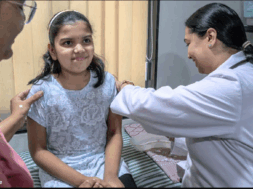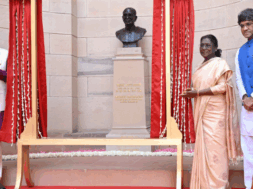
Manas Dasgupta
NEW DELHI, Aug 31: Amidst the nation-wide outrage over the horrific rape and murder of a trainee postgraduate doctor in a Kolkata hospital while on duty, the Prime Minister Narendra Modi on Saturday emphasised that atrocities committed against women and the safety of children were a serious concern in society and called for prompt action against crimes targeting women and children.
Raising the issue of women’s safety for the third time in recent weeks, Mr Modi said many strict laws had been enacted in the country for the safety of women but these needed to be made more active to act as a deterrent against such heinous crimes.
Speaking at the inaugural function of the National Conference of District Judiciary in Delhi on the occasion of 75 years of the Supreme Court, Mr Modi highlighted that the quicker the decisions in cases involving crimes against women the greater would be the assurance given to women, who form half the country’s population.
His strong remarks follow protests against the rape and murder of trainee doctor in Kolkata, the sexual abuse of two four-year-old school girls in Badlapur in Maharashtra, rape and murder of a nurse in Uttarakhand and a numerous other recent incidents of crime against women. “Today, atrocities against women, safety of children… are serious concerns of the society,” Mr Modi said.
“Many strict laws have been made in the country for the safety of women, but we need to make it more active. The faster the decisions are taken in cases related to atrocities against women, the greater assurance of safety half the population will get,” he added. In the last few weeks, the Prime Minister has repeatedly spoken about safeguarding women and also asked state governments to accord top priority to cases pertaining to women including during his address to the nation from the ramparts of the Red Fort on the Independence Day.
The PM said strict laws to protect women and give them justice were already in place and the government had planned fast-track courts in 2019. He pushed for deposition centres for crucial witnesses to testify without fear, and district committees with the District Judge, District Magistrate and Superintendent of Police concerned to coordinate action in such sensitive cases. The PM said the spirit of new criminal laws, including the Bhartiya Nyaya Sanhita, was “citizen first, dignity first and justice first.” He said the idea behind the Nyaya Sanhita was not just to punish citizens but to protect them.
Last week, Mr Modi termed crimes against women an unpardonable sin, adding the guilty should not be spared. Speaking at the ‘Lakhpati Didi Sammelan’ in north Maharashtra’s Jalgaon, Mr Modi said the safety of women should be a priority. “The safety of mothers, sisters, and daughters is the country’s priority. I have repeatedly raised this issue from the Red Fort,” he said. Modi said he would tell every political party and state government that crime against women was an unpardonable sin. Whoever is guilty should not be spared, he added.
Mr Modi also unveiled the stamp and coin commemorating 75 years of the establishment of the Supreme Court.
In his address, Chief Justice of India D.Y. Chandrachud said the district judiciary was the first point of contact for a citizen in search of justice and was the “backbone of the judiciary.” “We must stop calling the district judiciary the ‘subordinate’ judiciary. Seventy-five years after Independence, the time has come for us to bury one more relic of the British era — the colonial mindset of subordination,” the Chief Justice said.
The CJI drew attention to the phenomenon of more women joining the district judiciary. He said that 72% of the total number of judicial officers were women in the latest recruitment in Kerala.
Senior advocate Kapil Sibal, Supreme Court Bar Association president, added a sober note by pointing out that “trial courts and the district courts are loath to grant bail in matters of some significance is itself symptomatic of the malaise that has set in.” He highlighted the recent Supreme Court judgments which had upheld the principle that bail was the rule and jail an exception.
“Our trial court, district and sessions courts need to be empowered to deliver justice without fear or favour… The judiciary at that level should be instilled with the confidence that their judicial pronouncements shall never be held against them and they represent the spinal cord of the justice delivery system,” Mr Sibal said.
Law Minister Arjun Ram Meghwal, Supreme Court and High Court judges, judicial officers across the country, and Supreme Court Advocates-on-Record Association president, advocate Vipin Nair, and other office bearers were among those present at the function.
Meanwhile, a section of the Trinamool Congress leadership are learnt to be feeling unease with the chief minister Mamata Banerjee’s decision to push for capital punishment for rape expected next week following the gruesome RG Kar Hospital case. The move has brought the focus and attention back to the Justice Verma committee report adopted in 2013, just after the Nirbhaya case in Delhi.
The committee submitted its report in 29 days and it was then studied in detail by a M Venkaiah Naidu-headed parliamentary standing committee. Based on the committee’s recommendations, the Criminal Law (Amendment) Act was passed for stringent punishment in all cases of rape and sexual assault. However, almost all the members of the committee then were unanimous in one view: capital punishment was not an effective deterrent against rape as events showed. The focus would have to be on changing mindsets and speedy justice.
Interestingly, one of the members of the committee was Trinamool Congress’s Kakoli Ghosh Dastidar who is the MP from Barasat. Like others, she too had objected to capital punishment and thought that harsh penalties could be brought in, other than this.
Ms Ghosh Dastidar explained her stand on the issue and denied that it was a damage-control move. “I think women should be strong and castration is effective as a deterrent. As for the demand by the Bengal government, it’s their stand considering the heinous nature of the crime and since the matter is with the CBI, I don’t want to comment further,” she said.
West Bengal chief minister Mamata Banerjee has written two letters to Prime Minister Narendra Modi, asking for speedy justice and capital punishment within a fixed time frame for such cases. She has also asked the PM to come out with a stronger anti-rape law. Union women and child development minister Annpurna Devi has responded to both these letters, explaining in detail how the new criminal laws or the Bharatiya Nyaya Sanhita are strong deterrents.
The BJP has mocked the letters of the CM and the plan to bring a bill for capital punishment by the Bengal government as mere damage control and cover-up. The bill would need the governor’s, nod which may not come easily. The Centre has maintained that present laws are sufficiently harsh on criminals. Many in the TMC feel that even in many countries outside India capital punishment have not been able to ensure an end to crimes against women. But with Mamata and Abhishek Banerjee fighting the big fight against the belligerent BJP and almost with their backs to the wall, the TMC hopes to capitalise on the proposed bill to fight against the might of the ruling party at the Centre.














